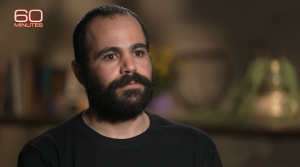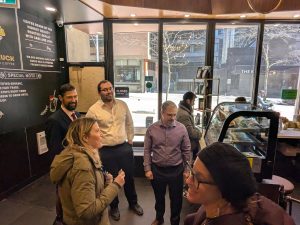Next month, the sisterhood at Vancouver’s Temple Sholom is going axe throwing in Surrey, B.C. In the following months, they’ll visit an escape room and hold a networking event. If that sounds like a refreshing change to the usual fare of fundraising, card games and knitting (which they also do), it’s intentional.
In an era in which women can ascend to the bimah as rabbis in many shuls and preside over the boardroom, sisterhoods are finding it difficult to prove they’re still relevant. For every sisterhood like Temple Sholom’s, which has been recognized by the Reform movement for its ability to attract younger women, there are more that are withering, or have folded altogether.
Historically, these women’s groups were the backbone of synagogue life, both as fundraisers and volunteers, although their contributions went largely unrecognized.
Rabbi Raysh Weiss, a Conservative rabbi in Halifax, began researching and writing about the Women’s League of Conservative Judaism while she was a student at the Jewish Theological Seminary.
“What struck me was there had really been no institutional history written about this pivotal organization,” she said. “I was really surprised by the fleeting references to it in all the official histories. These are women who fundraised really aggressively and continue to do so, without whose help the seminary wouldn’t exist … and they were given at best passing mention in these broader histories of the (Conservative) movement.”
The sisterhood folded many years ago at Shaar Shalom, the synagogue that Rabbi Weiss leads. In many synagogues that no longer have a surplus of female volunteers, work such as preparing the kiddush and running the gift shop have been outsourced to paid employees, she noted.
And while Rabbi Weiss doesn’t pine for the days when more women were at home, she said that there are now fewer people who are willing to volunteer and join community organizations.
“We see this across the board with the younger demographic, no matter whether it’s women or men, there’s more of a challenge to commit to regular attendance in anything that’s not work-related or immediately related to one’s family,” she said. “I don’t chalk it up to a gender distinction, it’s a universal challenge.”
Margie Miller is a few decades older than Rabbi Weiss and admitted that she’s a little bit sensitive when the discussion turns to declining sisterhood membership. Miller is the international president of the Women’s League for Conservative Judaism and her energy crackled across the phone line. It’s not only sisterhoods, it’s all faith-based groups, including synagogues, that are having a hard time getting people to join, she pointed out.
But Miller argued that it’s not that younger women don’t want to find a sense of community and friendships, it’s that they don’t see synagogues, and specifically sisterhoods, as a way to do that.
“I go to 50 shuls a year,” she said. “We need to be not dismissive of gals who have been here for 50 years … but we do need to be open to a very different way and we need to be inclusive.…
“So if those gals want to make the kiddush, God bless them. But if a younger, or working, woman says, ‘That’s not interesting to me, please don’t judge me,’ then we need to make sure that there’s room at the table for her.”
Miller, 69, first joined the sisterhood in her suburban New York synagogue when she was newly married and in her late 20s. “In those days, you just joined,” she recalled. “That was where I met friends.”
There is still a strong case to be made for sisterhoods, Miller said. They can help people who are intimidated by Jewish ritual find a community and become engaged in Jewish life.
But if sisterhoods are going to make it, they need to acknowledge that a younger generation doesn’t want to spend six months planning a program.
“We can’t sit at meetings, let’s just make decisions,” is what Miller said she hears from many younger women.
READ: FEW CHOICES LEFT FOR DAY SCHOOL PARENTS IN YORK REGION
Rabbi Marla Feldman, the executive director of Women of Reform Judaism (WRJ), also has no trouble making the case for women’s groups, even in a movement that has long been egalitarian.
It was sisterhoods that pushed the movement to ordain female rabbis, she said. More recently, it was sisterhoods that championed the issue of the gender-based pay gap for clergy and professionals in the Reform movement.
“Everyone agrees that it’s a problem, but it’s taken the women of Reform Judaism to really move it forward and to bring in our congregations and organizations,” she said.
Sisterhoods also continue to be a valuable training ground for women to learn to be leaders, Rabbi Feldman said.
“It plays a very important role for those women who will thrive in a setting that is nurturing, that cares about their leadership.
A significant number of women leaders cultivated their skills in a women’s group.”
Rabbi Feldman said that the sisterhoods in the Reform movement run “the gamut. Across North America, we’ve got hundreds of women’s groups. Some are strong and thriving and turning leadership over in a healthy way and others are aging and struggling to attract younger members.”

Temple Sholom’s sisterhood in Vancouver is a group that the Reform movement points to as a booming success. Mary Kleiner, the co-president of the sisterhood, said that the group’s emphasis has been changed to doing low-pressure activities outside the synagogue (which is where the axe throwing and escape room comes in). They’re still doing the book club and other programs that are popular with the older crowd, but the “ladies nights out” have attracted women ranging in age from their 20s to their 60s.
“We’re not concerned about numbers, as long as someone’s coming and we’re not breaking our backs planning for it,” she said.
Fundraising is still important, but is not their primary goal, because so many groups, both inside the synagogue and in the larger community, are asking for money, said Kleiner. In the past, the sisterhood has raised about $10,000 annually for projects such as making the synagogue more accessible and funding summer camp scholarships.
While many women grew up watching their mothers involved in sisterhoods, Kleiner, a convert to Judaism, didn’t have that experience.
Wanting to immerse herself, and her young family, in Jewish life, she joined the temple, began to study for her adult bat mitzvah and sang in the sisterhood’s choir. Within a few years, she was sitting on the temple’s board and was a natural choice when the former sisterhood president stepped down because of health issues.
Kleiner, who is 32, was the youngest woman at WRJ’s Pacific region convention in October. She and her co-president were the only women to bring their husbands and young children to the conference.
“It was quite amazing to see all these women of all ages, all races so proud not just of being Jewish, but being part of the WRJ,” she said.
“I walked away feeling, ‘Wow, we have a pretty badass sisterhood. We’re growing and everyone’s numbers are declining.’ It made me proud of my synagogue.”
Randi Fine hopes the sisterhood at her Toronto synagogue, Adath Israel, makes the same transition. The sisterhood, which is led by a handful of women in their 80s, was fading. Fine and a group of baby boomers in their 50s and 60s, many of whom fondly remember their own mothers going to sisterhood, are now trying to revive it.
“There is still a feeling that women enjoy being with other women,” said Fine.
For a start, they’ve changed the name to Women of Adath. “The name ‘sisterhood’ has come in our shul to mean older women. It doesn’t resonate anymore,” she said.
Working as a committee of 14 women, the group is still feeling its way. But a few new programs, such as a woman’s challah bake and a discussion on Jewish perspectives on the #MeToo movement, have attracted woman ranging in age from 20 to 90.
The Conservative synagogue already has an active young families group. The benefit of the sisterhood is that it allows single women in their 30s to get involved, as well.
“We would like to encourage that group to get involved,” Fine said. “I don’t want to be a group of older women planning for younger women. That doesn’t work.”
But not all sisterhoods have to reinvent themselves in order to thrive. At Beth Avraham Yoseph of Toronto (BAYT), an Orthodox synagogue in suburban Toronto, the sisterhood has attracted young women to be its leaders, while still hewing to more traditional roles. One of its biggest fundraisers is preparing mishloach manot (gift baskets) for Purim, a project that involves dozens of women and brings in over $30,000 annually. The money supports everything from adult education to youth programs and the mikveh.
The sisterhood also runs a food bank and arranges for special kiddushes and speakers for women during Jewish holidays. Their next program will be a concert for women, an evening that Miriam Klein, co-president of the sisterhood, describes as both “a fundraiser and a feel-good event.”
Klein grew up at the BAYT and watched her mother participate in the sisterhood. “My mom’s generation was happy to hand over the torch,” she said.
“We (Klein and her co-president) both have full-time jobs, we both have little kids. I attend every executive meeting and every board meeting of the shul. If we want continuity in our shul, people have to step up and help.”
But while the BAYT has been able to attract a wide variety of ages to its sisterhood, other Orthodox synagogues have struggled, in the same way as their liberal counterparts. Shaarei Shomayim, an Orthodox synagogue in midtown Toronto, has a sisterhood that is barely active. The women’s group still puts on a few programs, but no one has volunteered to run the group, said the synagogue’s executive director.
Louise Raber, co-chair of the sisterhood at Shaarey Zedek, a Conservative synagogue in Winnipeg, is worried that her group may be going down the same path.
The sisterhood is thriving for now, she said, “but we’re going strong based upon the same people. I have been president and co-president for numerous years, because nobody will take on the position.”
The synagogue has two younger rabbis and Raber said that young families are joining the shul, but not the sisterhood.
“Some people say it’s the name, that ‘sisterhood’ makes people think of their bubbes,” Raber said.
When the sisterhood runs a program, younger people come, but they are reluctant to join and take charge, according to Raber.
Despite this, the sisterhood continues to run programs, visit nursing homes and do some fundraising. For over three decades, the sisterhood has sponsored a program where participants learn to weave on looms. About three-quarters of the synagogue’s bar and bat mitzvah students wear a tallit woven by a parent or grandparent, Raber said.
When Shaarey Zedek hosted a city-wide vigil last year in memory of the victims of the Pittsburgh synagogue shooting, sisterhood members were called on to help with ushering.
Raber is optimistic that the sisterhood, where her own mother volunteered, will survive. She has her eye on a few younger women who have teenage children and friends in the increasingly diverse Winnipeg Jewish community, who might be interested in taking charge.
“Our hope is that as people age and their children age and as people are returning to the synagogue, which they are, there will be more young people who will take over,” she said. “Hopefully, we’re not having pipe dreams.”






